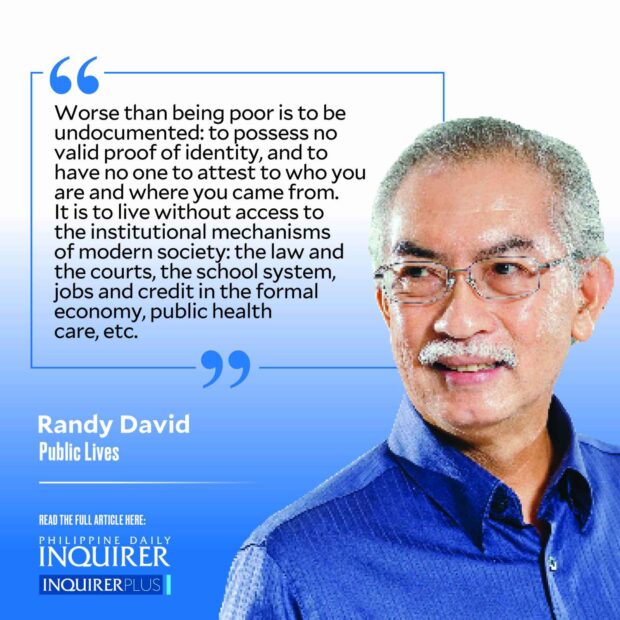Undocumented: A different way of being poor

Worse than being poor is to be undocumented: to possess no valid proof of identity, and to have no one to attest to who you are and where you came from. It is to live without access to the institutional mechanisms of modern society: the law and the courts, the school system, jobs and credit in the formal economy, public health care, etc.
There has been a lot of talk lately about inclusiveness as a component of poverty alleviation. Used in this context, the concept seems just another buzzword. But it is more than a semantic shift. It mirrors real structural changes in the way society operates.
In traditional society, one could be poor but not socially excluded. But modern society operates differently. Here, individuals no longer draw their primary identities from their families but from their participation in the institutional systems of the larger society. A credit card or a billing statement, a social security number, a driver’s license, a passport, or a medical insurance card — these are typically given more weight as proof of identity than a birth certificate.
In the early 1990s, while doing research on Filipino workers in Japan, I met a Filipino woman who had overstayed her tourist visa and was then living in a consensual relationship with a Japanese man. The story of her life vividly illustrated for me what it meant to be not just poor but to be excluded from the functional circuits of modern society.
Barely in her 20s, Sara (not her real name) had entered Japan on a 15-day tourist visa. Her Japanese recruiter sent her to work as an entertainer in a so-called “snack bar” on the outskirts of Kyoto. After six months of nightly work, dancing, and keeping lonely and tired men company, Sara fell ill. Her visa having expired, she was completely at the mercy of the recruiter who kept her passport. One of her regular customers, a small contractor who did home repairs, offered to bring her to a clinic near his community. He paid for all her medical expenses.
Taking a look at Sara after her discharge, Sara’s handler decided she was too frail to go back to work. He offered to release her from her contract if she would reimburse the expenses incurred in bringing her over to Japan. The Japanese man who took care of her promptly paid for her freedom and brought her home.
The couple had been living together for about five years when I met them. They had two beautiful children. Sara shyly spoke to me in Filipino. She told me that she and her husband had figured in a car accident that severely injured both of them. Fearing that reporting the accident to the police might expose her as an overstaying alien, her husband did not seek treatment for their injuries. A kind social worker in their community persuaded them to go to a hospital and file for insurance benefits, for which they needed a police report. She assured them that Sara’s status was a matter for the justice department but was of little concern to the local police.
I came to know about Sara after the same social worker contacted my Japanese professor friend who had written some newspaper articles about the Philippines.
Their fondest dream, they told me, was to get legally married. To do that, she needed to renew her expired Philippine passport as a first step to legalizing her status in Japan. I offered to accompany them to the Philippine consulate in Kobe. There they were told that renewing Sara’s passport was not a problem. But, for her to contract marriage in Japan, she needed certification from the Philippines attesting that she was free to marry. She was advised to ask a relative or a friend back home to get this document for her.
My Japanese professor friend informed me that they finally managed to get married months later. He said that their next hurdle was to apply for a change of her status in Japan from tourist to spouse, for which she would need a lawyer. He assured me that he would continue to help them.
We now know that one does not need to be stranded in a foreign country as an undocumented alien to experience a life of exclusion. Here at home, countless Filipino couples are unable to marry officially simply because, for any number of reasons, they are unable to produce the birth certificates needed to secure a marriage license. Their children could not be properly enrolled in public schools because they, too, did not have birth certificates. This largely undetected problem became visible when more than 19 million of the 22 million first applicants for the Philippine Identification System national ID in 2020 could not present a birth certificate or any requisite primary document. By allowing the submission of secondary supporting documents such as a voter’s ID, postal ID, barangay ID, or a PhilHealth card in lieu of a birth certificate, the registration for a national ID has become the single most important step toward inclusiveness.




















